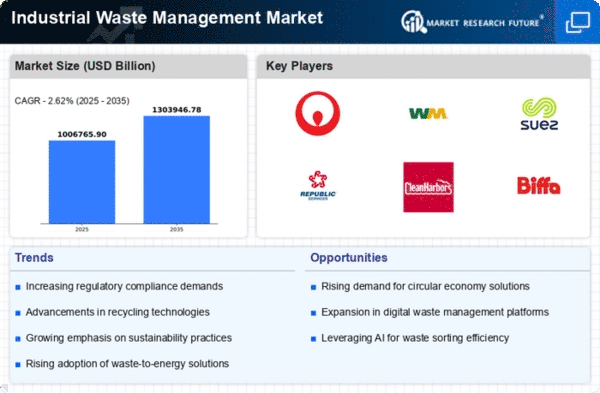Top Industry Leaders in the Industrial Waste Management Market

The industrial waste management sector is a colossal industry influenced by factors such as rapid industrialization, stringent regulations, and growing environmental awareness. This dynamic and fiercely competitive space experiences a perpetual power struggle between established industry giants and agile newcomers. In this comprehensive exploration, we will delve into the strategies of key players, analyze determinants of market share, and examine emerging trends that continue to shape this ever-evolving landscape.
Key Player Strategies: Diversification and Technological Advancements
Prominent players, including
Veolia Environmental
EnviroServ Waste
SembCorp
Reclay Group
SA Waste Holding Pvt Ltd.
Suez Environnement
Stericycle Inc.
Himark BioGas Inc.
Clean Harbor, and others.Their strategies include:
-
Expanding Service Portfolios: Beyond traditional waste collection and disposal, these industry leaders are diversifying by offering specialized services such as recycling, resource recovery, and on-site treatment, catering to the diverse needs of various industries.
-
Geographical Expansion: Established players are acquiring regional companies and venturing into new markets, particularly in developing economies with burgeoning industrial sectors. This expansion enhances their market reach and positions them strategically on a global scale.
-
Investing in Technological Advancements: Automation, artificial intelligence (AI), and the Internet of Things (IoT) are integral to optimizing operations, enhancing efficiency, and gaining a competitive edge. These technologies contribute to the evolution of waste management practices.
Market Share Analysis: Complex Determinants
Several factors influence a company's market share in this intricate ecosystem:
-
Waste Type Expertise: Companies specializing in hazardous waste management, equipped with intricate regulatory knowledge, command a premium in the market.
-
Geographical Reach: A broader footprint translates to larger client bases and economies of scale, providing multinational players with a competitive advantage.
-
Technological Capabilities: Cutting-edge waste treatment technologies and data-driven optimization strategies attract clients seeking sustainable solutions and bolster a company's market position.
-
Reputation and Brand Recognition: Companies with a proven track record of safe, reliable, and environmentally responsible waste management inspire trust and secure long-term contracts.
Emerging Trends: Shaping the Future of Industrial Waste Management
The industrial waste management landscape is in a constant state of evolution, with emerging trends reshaping the competitive terrain:
-
The Rise of Circular Economy: Companies are increasingly focused on transforming waste into valuable resources through recycling, upcycling, and resource recovery. This not only reduces reliance on landfills but also opens new revenue streams.
-
Decentralization and On-site Treatment: Traditional centralized waste management systems are giving way to smaller, on-site treatment facilities. This shift reduces transportation costs, minimizes environmental impact, and addresses specific waste streams more efficiently.
-
Data-Driven Insights: AI and IoT technologies are employed to monitor waste generation, optimize collection routes, and predict equipment maintenance needs. This data-driven approach enhances operational efficiency and leads to significant cost savings.
-
Sustainability Takes Center Stage: Clients are increasingly seeking environmentally responsible waste management solutions. Companies are investing in renewable energy sources, reducing carbon footprints, and adopting greener technologies to meet this growing demand.
The Competitive Scenario: Striking a Dynamic Equilibrium
The industrial waste management market is a delicate balance between established players and nimble innovators. While large corporations leverage their brand recognition and extensive networks, smaller companies capitalize on niche expertise, technological agility, and local market knowledge. Collaborations and strategic partnerships are becoming more prevalent as companies recognize the value of combining resources and expertise to tackle complex waste streams.
Navigating the Ever-Changing Landscape
The industrial waste management market mirrors the ever-changing dynamics of the business world. Understanding key player strategies, market share determinants, and emerging trends is essential for companies seeking to navigate this competitive landscape and establish a sustainable foothold. As technology advances, regulations tighten, and environmental consciousness deepens, the race for dominance will intensify, promising exciting developments and innovative solutions in the years to come.
Recent Developments and Updates:
-
Veolia Environnement:
-
Date: November 30, 2023 -
Source: Veolia website -
Development: Veolia partnered with the World Bank to launch a €50 million project aimed at improving waste management in Madagascar.
-
-
EnviroServ Waste:
-
Date: August 31, 2023 -
Source: JSE SENS announcement -
Development: EnviroServ Waste acquired Columinate, a South African hazardous waste management company, for R1.1 billion.
-
-
SembCorp:
-
Date: December 7, 2023 -
Source: SembCorp website -
Development: SembCorp launched a new sustainable industrial waste management facility in China, investing S$70 million in advanced recycling technologies.
-










